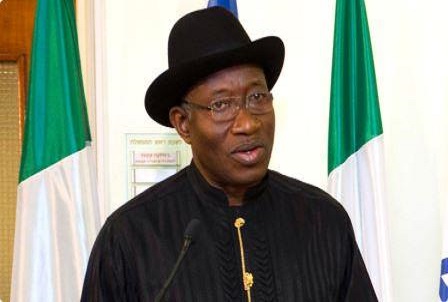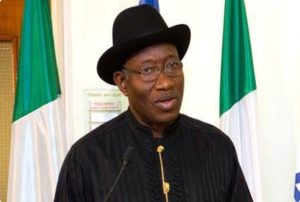Economy
Jonathan Denies Involvement in Malabu Oil Scam


By Dipo Olowookere
Immediate past President, Mr Goodluck Jonathan, has reacted to reports in Nigeria that he was given kickbacks in the $1.3 billion OPL 245 oil block deal involving oil giants ENI and Royal Dutch Shell.
In a statement issued on Tuesday by his media adviser, Mr Ikechukwu Eze, the former President said the report lacked any “factual evidence.”
Mr Jonathan noted that he was not in any way “accused, indicted or charged for corruptly collecting any monies as kickbacks or bribes from ENI by the Italian authorities or any other law enforcement body the world over.”
He explained that the negotiations and transactions for the oil block deal predate his Presidency, which began on May 6, 2010 and ended on May 29, 2015.
Mr Eze disclosed in the statement that, “It may interest those promoting this false narrative to know that all the documents relating to the transactions, issues and decisions of the Federal Government on the Malabo issue, during the Jonathan administration, are in the office of the Attorney General of the Federation/Minister of Justice.
“As President of Nigeria, there is no doubt that Dr Goodluck Jonathan met with executives of all the oil majors operating in Nigeria and urged them to, amongst other things, support the growth of the Nigerian oil industry by ramping up their investments and comply with the Local Content Act that he promoted and signed into law.
“We however wish to state, for emphasis, that at no time did the former President hold private meetings with representatives of ENI to discuss pecuniary issues.
“All the meetings and discussions former President Jonathan had with ENI, other IOCs and some indigenous operators were conducted officially, and in the presence of relevant Nigerian Government officials and were done in the best interest of the country.
“We make bold to point out that the former President never sent any Abubakar Aliyu, as the innuendoes in the false report suggest, to ENI, the IOCs or any indigenous operator to seek favour or collect any gratification on his behalf.
“We will like to point out for the umpteenth time that whether in office or out of office, former President Jonathan does not own any bank account, aircraft or real estate outside Nigeria. Anyone with contrary information is challenged to publicly publish same.
“As the President who signed the Freedom of Information Act into law, Dr. Goodluck Jonathan lifted the veil on governance and encouraged transparency knowing that evil breeds in secrecy. It is the opinion of the former President that journalists and media houses should take advantage of this law in their investigative journalism rather than rely on hearsay.
“We hope that these clarifications will help guide future reports which should be factual.”
Economy
Again, OPEC Cuts 2024, 2025 Oil Demand Forecasts

By Adedapo Adesanya
The Organisation of the Petroleum Exporting Countries (OPEC) has once again trimmed its 2024 and 2025 oil demand growth forecasts.
The bloc made this in its latest monthly oil market report for December 2024.
The 2024 world oil demand growth forecast is now put at 1.61 million barrels per day from the previous 1.82 million barrels per day.
For 2025, OPEC says the world oil demand growth forecast is now at 1.45 million barrels per day, which is 900,000 barrels per day lower than the 1.54 million barrels per day earlier quoted.
On the changes, the group said that the downgrade for this year owes to more bearish data received in the third quarter of 2024 while the projections for next year relate to the potential impact that will arise from US tariffs.
The oil cartel had kept the 2024 outlook unchanged until August, a view it had first taken in July 2023.
OPEC and its wider group of allies known as OPEC+ earlier this month delayed its plan to start raising output until April 2025 against a backdrop of falling prices.
Eight OPEC+ member countries – Saudi Arabia, Russia, Iraq, United Arab Emirates, Kuwait, Kazakhstan, Algeria, and Oman – decided to extend additional crude oil production cuts adopted in April 2023 and November 2023, due to weak demand and booming production outside the group.
In April 2023, these OPEC+ countries decided to reduce their oil production by over 1.65 million barrels per day as of May 2023 until the end of 2023. These production cuts were later extended to the end of 2024 and will now be extended until the end of December 2026.
In addition, in November 2023, these producers had agreed to voluntary output cuts totalling about 2.2 million barrels per day for the first quarter of 2024, in order to support prices and stabilise the market.
These additional production cuts were extended to the end of 2024 and will now be extended to the end of March 2025; they will then be gradually phased out on a monthly basis until the end of September 2026.
Members have made a series of deep output cuts since late 2022.
They are currently cutting output by a total of 5.86 million barrels per day, or about 5.7 per cent of global demand. Russia also announced plans to reduce its production by an extra 471,000 barrels per day in June 2024.
Economy
Aradel Holdings Acquires Equity Stake in Chappal Energies

By Aduragbemi Omiyale
A minority equity stake in Chappal Energies Mauritius Limited has been acquired by a Nigerian energy firm, Aradel Holdings Plc.
This deal came a few days after Chappal Energies purchased a 53.85 per cent equity stake in Equinor Nigeria Energy Company Limited (ENEC).
Chappal Energies went into the deal with Equinor to take part in the oil and gas lease OML 128, including the unitised 20.21 per cent stake in the Agbami oil field, operated by Chevron.
Since production started in 2008, the Agbami field has produced more than one billion barrels of oil, creating value for Nigerian society and various stakeholders.
As part of the deal, Chappal will assume the operatorship of OML 129, which includes several significant prospects and undeveloped discoveries (Nnwa, Bilah and Sehki).
The Nnwa discovery is part of the giant Nnwa-Doro field, a major gas resource with significant potential to deliver value for Nigeria.
In a separate transaction, on July 17, 2024, Chappal and Total Energies sealed an SPA for the acquisition by Chappal of 10 per cent of the SPDC JV.
The relevant parties to this transaction are working towards closing out this transaction and Ministerial Approval and NNPC consent to accede to the Joint Operating Agreement have been obtained.
“This acquisition is in line with diversifying our asset base, deepening our gas competencies and gaining access to offshore basins using low-risk approaches.
“We recognise the strategic role of gas in Nigeria’s energy future and are happy to expand our equity holding in this critical resource.
“We are committed to the cause of developing the significant value inherent in the assets, which will be extremely beneficial to the country.
“Aradel hopes to bring its proven execution competencies to bear in supporting Chappal’s development of these opportunities,” the chief executive of Aradel Holdings, Mr Adegbite Falade, stated.
Economy
Afriland Properties Lifts NASD OTC Securities Exchange by 0.04%

By Adedapo Adesanya
Afriland Properties Plc helped the NASD Over-the-Counter (OTC) Securities Exchange record a 0.04 per cent gain on Tuesday, December 10 as the share price of the property investment rose by 34 Kobo to N16.94 per unit from the preceding day’s N16.60 per unit.
As a result of this, the market capitalisation of the bourse went up by N380 million to remain relatively unchanged at N1.056 trillion like the previous trading day.
But the NASD Unlisted Security Index (NSI) closed higher at 3,014.36 points after it recorded an addition of 1.09 points to Monday’s closing value of 3,013.27 points.
The NASD OTC securities exchange recorded a price loser and it was Geo-Fluids Plc, which went down by 2 Kobo to close at N3.93 per share, in contrast to the preceding day’s N3.95 per share.
During the trading session, the volume of securities bought and sold by investors increased by 95.8 per cent to 2.4 million units from the 1.2 million securities traded in the preceding session.
However, the value of shares traded yesterday slumped by 3.7 per cent to N4.9 million from the N5.07 million recorded a day earlier, as the number of deals surged by 27.3 per cent to 14 deals from 11 deals.
Geo-Fluids Plc remained the most active stock by volume (year-to-date) with 1.7 billion units sold for N3.9 billion, trailed by Okitipupa Plc with 752.2 million units valued at N7.8 billion, and Afriland Properties Plc with 297.5 million units worth N5.3 million.
Also, Aradel Holdings Plc remained the most active stock by value (year-to-date) with 108.7 million units worth N89.2 billion, followed by Okitipupa Plc with 752.2 million units valued at N7.8 billion, and Afriland Properties Plc with 297.5 million units sold for N5.3 billion.
-

 Feature/OPED5 years ago
Feature/OPED5 years agoDavos was Different this year
-
Travel/Tourism8 years ago
Lagos Seals Western Lodge Hotel In Ikorodu
-

 Showbiz2 years ago
Showbiz2 years agoEstranged Lover Releases Videos of Empress Njamah Bathing
-

 Banking6 years ago
Banking6 years agoSort Codes of GTBank Branches in Nigeria
-

 Economy2 years ago
Economy2 years agoSubsidy Removal: CNG at N130 Per Litre Cheaper Than Petrol—IPMAN
-

 Banking2 years ago
Banking2 years agoFirst Bank Announces Planned Downtime
-

 Sports2 years ago
Sports2 years agoHighest Paid Nigerian Footballer – How Much Do Nigerian Footballers Earn
-

 Technology4 years ago
Technology4 years agoHow To Link Your MTN, Airtel, Glo, 9mobile Lines to NIN

















